|
|
|
Sort Order |
|
|
|
Items / Page
|
|
|
|
|
|
|
| Srl | Item |
| 1 |
ID:
119191
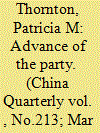

|
|
|
|
|
| Publication |
2013.
|
| Summary/Abstract |
While existing scholarship focuses attention on the impact of state control and repression on Chinese civil society, the increasingly independent role of the Communist Party has been largely overlooked. This article reviews the Party's drive to "comprehensively cover" grassroots society over the previous decade against the theoretical debate unfolding among Chinese scholars and Party theoreticians regarding the Party's role with respect to civil society. Focusing on greater Shanghai, frequently cited as a national model of Party-building, I describe the Party's advance and the emergence of Party-organized non-governmental organizations (PONGOs), a new hybrid form of social organization sponsored and supported by local Party committees. I argue that these developments invite a reconsideration of our understandings of the ongoing "associational revolution" and of the Party's relationship to China's flourishing "third realm."
|
|
|
|
|
|
|
|
|
|
|
|
|
|
|
|
| 2 |
ID:
086691
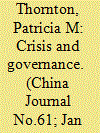

|
|
|
|
|
| Publication |
2009.
|
| Summary/Abstract |
How crisis-prone is the reform-era Chinese state? Whereas some have characterized it as a regime suffering from a hidden crisis of governance, or instead as one that has responded effectively to critical challenges by redesigning its core institutions, this article examines the political utility of crisis as a mobilizational tool from the Mao era to the present. Using the SARS outbreak of 2003 as a case study, I seek to demonstrate that, in fact, the rhetoric of crisis can help to legitimate extraordinary interventions by social and political elites, subvert the standard bureaucratic procedures that characterize normal politics and create political space for extraordinary mobilizations of resources to overcome challenges. The continuing deployment of crisis rhetoric by the Hu-Wen leadership can thus be read as one legacy of the mobilizational dynamics of the Mao-era state.
|
|
|
|
|
|
|
|
|
|
|
|
|
|
|
|
| 3 |
ID:
148763
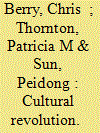

|
|
|
| 4 |
ID:
148768
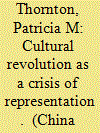

|
|
|
|
|
| Summary/Abstract |
The May 16 Notification, which set the agenda for the Cultural Revolution, named the movement's key targets as those “representatives of the bourgeoisie who have sneaked into the Party, the government, the army, and all spheres of culture.” The ensuing uprising of students and workers, many of whom claimed to be the loyal “representatives” of revolutionary and radical forces at the grassroots of society, exposed the fulminating crisis of political representation under CCP rule. This article considers the Cultural Revolution as a manifestation of a continuing crisis of representation within revolutionary socialism that remains unresolved to the present day, as demonstrated by the tepid popular response to Jiang Zemin's “three represents” and widespread contemporary concerns about the Party's “representativeness” (daibiaoxing 代表性) in the wake of market reform. Although the Cultural Revolution enabled both public debate of and political experimentation with new forms of representative politics, the movement failed to resolve the crisis. The Party's lingering disquiet regarding issues of representation thus remains one legacy of the Cultural Revolution.
|
|
|
|
|
|
|
|
|
|
|
|
|
|
|
|
| 5 |
ID:
113929
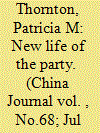

|
|
|
|
|
| Publication |
2012.
|
| Summary/Abstract |
While the 2004 introduction of a Party-organized trade union in Wal-Mart's mainland China-based stores was widely reported, far less is known about official Party branches and committees in the non-state-owned sector. Well over 3.5 million Party members now work in "non-publicly owned enterprises", a sector of the economy in which the Party has continued to expand. The Party is experimenting with new organizational arrangements and remaking its social agenda in order to increase its popularity, relevance and appeal, particularly among young urban professionals. This article outlines recent Party-building initiatives in the private sector over the last decade. Drawing upon membership and other data from over 1,000 local Party committees in non-publicly owned enterprises in greater Shanghai, I analyze contemporary "Party life" in "two new" branches-new social and new economic organizations since the adoption of market reform-as a reflection of the Party's possible future as it absorbs the "advanced forces" of an increasingly market-oriented China.
|
|
|
|
|
|
|
|
|
|
|
|
|
|
|
|
| 6 |
ID:
181925
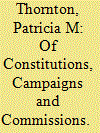

|
|
|
|
|
| Summary/Abstract |
Democratic centralism, a hallmark of Leninist party organizations, has played a formative role in the history of the Chinese Communist Party (CCP). Yet despite being hailed as an “inviolable” and “unchanging” Party principle, understandings of democratic centralism have shifted dramatically over the century of its existence. This study traces the long arc of the concept's evolution across successive Party Constitutions, focusing on three critical historical junctures: the Sixth Party Congress, which formally adopted democratic centralism into its Constitution as an organizational principle; the Seventh Party Congress, which adopted rectification as the Party's practice of democratic centralism; and the 19th Party Congress, which set a new milestone in codifying the system as a disciplinary tool. I argue that while democratic centralism exemplifies the CCP's institutional plasticity and adaptive governance and is critical to understanding Party-driven constitutionalism in contemporary China, it also highlights an irresolvable paradox inherent in Party rule. Adaptability does not necessarily impart resilience. I conclude that the CCP's normatively unconstrained extra-constitutional leadership under Xi Jinping highlights the essentially and increasingly irrationalist aspects of its illiberal governance project.
|
|
|
|
|
|
|
|
|
|
|
|
|
|
|
|
| 7 |
ID:
181922
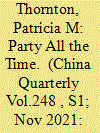

|
|
|
|
|
|
|
|